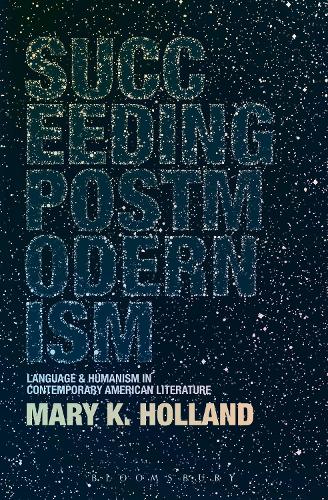
Succeeding Postmodernism: Language and Humanism in Contemporary American Literature
(Paperback)
Available Formats
Publishing Details
Succeeding Postmodernism: Language and Humanism in Contemporary American Literature
By (Author) Dr. Mary K. Holland
Bloomsbury Publishing PLC
Bloomsbury Academic USA
23rd October 2014
United States
Classifications
Tertiary Education
Non Fiction
Literary studies: c 1900 to c 2000
813.009
Physical Properties
Paperback
232
Width 152mm, Height 229mm
318g
Description
While critics collect around the question of what comes "after postmodernism," this book asks something different about recent American fiction: what if we are seeing not the end of postmodernism but its belated success Succeeding Postmodernism examines how novels by DeLillo, Wallace, Danielewski, Foer and others conceptualize threats to individuals and communities posed by a poststructural culture of mediation and simulation, and possible ways of resisting the disaffected solipsism bred by that culture. Ultimately it finds that twenty-first century American fiction sets aside the postmodern problem of how language does or does not mean in order to raise the reassuringly retro question of what it can and does mean: it finds that novels today offer language as solution to the problem of language. Thus it suggests a new way of reading "antihumanist" late postmodern fiction, and a framework for understanding postmodern and twenty-first century fiction as participating in a long and newly enlivened tradition of humanism and realism in literature.
Reviews
Compelling first book Holland presents a nuanced reading of contemporary literatures departure from postmodernism. * Twentieth-Century Literature *
A fine and close analysis of several American novels written in the twenty-first century allowed her to grasp in them a resistance to the disaffected solipsism bred by the post-cultural culture of mediation and simulation and to anchor late postmodern fiction in a long humanist tradition respectful of individuals and communities. * American Book Review *
Holland gives readers a new map of the contemporary novel that registers the landscape with more precision than any earlier scholar-cartographer has managed. Her sequence of finely-grained readings synthesizes the insights of poststructuralism with the urgent impulse toward real meaning and value in twenty-first century fiction, to describe a mobius-strip realism that emerges out of the matter of fiction and that characterizes fiction that matters. -- Stephen J. Burn, Northern Michigan University, USA
Mary Holland's Succeeding Postmodernism offers a marvelously astute and insightful argument about what she calls a new humanism, a re-assertion of values that matter and inform the struggles articulated in contemporary fictions. Far from naivet, this is a kind of humanism that takes full account of the anti-humanist tendencies of poststructuralism and yet resolutely insists on the potentiality of language to intervene in meaningful ways in our lives. For scholars of the contemporary period, this is an important text not only to read but also to consider assigning for classes. -- N. Katherine Hayles, Professor of Literature and Director of Graduate Studies, Duke University, USA
Mary Holland was one of the first critics to see that, with the appearance of figures like David Foster Wallace, something fundamental was changing in the landscape of contemporary fiction. And now, with the publication of Succeeding Postmodernism, we at last see her argument presented in full. Rather than the simple collapse of the postmodernist enterprise in favor of a new realist naivet, the swerve in literary history depicted here is one of repurposing and reclamation, with all of the famed sophistication of the postmodern now dedicated toward envisioning new forms of human connection. Holland's book will be of interest to anyone looking for a penetrating account of the stateand stakesof artistically ambitious fiction in our time. -- Mark McGurl, Professor of English, Stanford University, USA
For the last decade or so, weve heard a great deal of inconclusive talk about the 'post-postmodern era' and the 'post-ironic' novel. Mary Hollands bracing, densely argued book cuts through all the confusion and offers up a rigorous, firmly grounded overview of this emerging sensibility. Drawing upon recent reevaluations of humanism by Kwame Appiah and Edward Said, Holland discloses unexpected opportunities for empathy and ethical engagement in both poststructuralism and recent fiction by Don DeLillo, David Foster Wallace, Mark Danielewski, A. M. Homes, Jonathan Safran Foer, and Cormac McCarthy. Much like the novels it analyses, Succeeding Postmodernism is both technically dazzling and unapologetically humane. -- Marshall Boswell, Professor and Chair of English, Rhodes College, USA, and author of Understanding David Foster Wallace
In this sense, Succeeding Postmodernism is at once a very useful contribution to the field of literary studies...I would recommend it to students of literature. -- Timotheus Vermeulen * American Book Review *
Hollands Succeeding Postmodernism: Language and Humanism in Contemporary American Literature sees postmodernism as not repudiated but rather redirected so that its strategies and techniques can serve a renewed purposeHollands study shows how language can rebuild a sense of hope from the fragments that survive postmodernisms deconstruction. -- Jerome Klinkowitz, University of Northern Iowa * American Literary Scholarship *
Author Bio
Mary K. Holland is Assistant Professor of contemporary literature at The State University of New York, New Paltz, USA. Her work on irony and narcissism, poststructural realism, and mothering and media in fiction and film has appeared in Critique, The Journal of Popular Culture, and A Companion to David Foster Wallace Studies.
